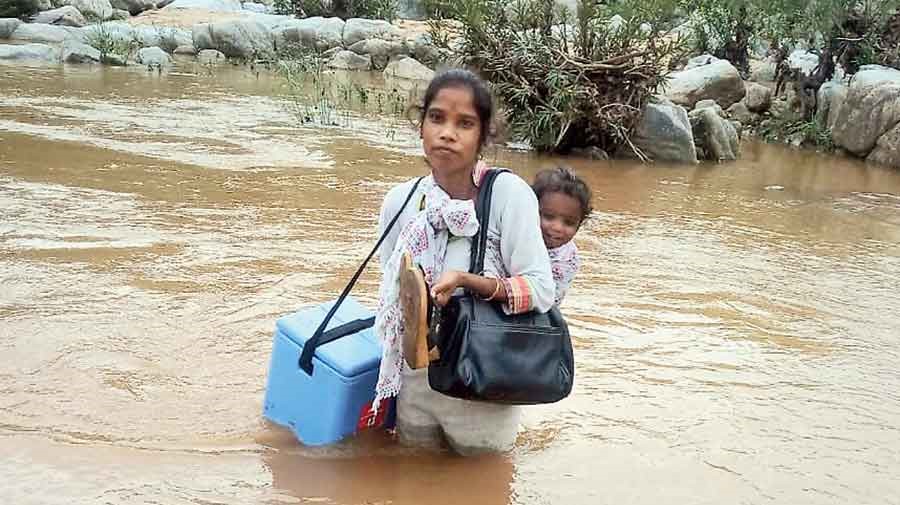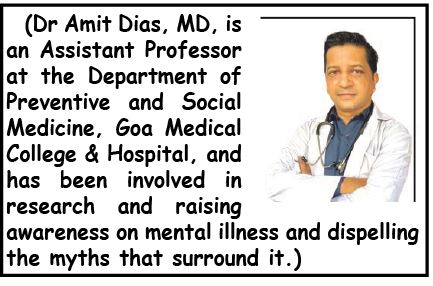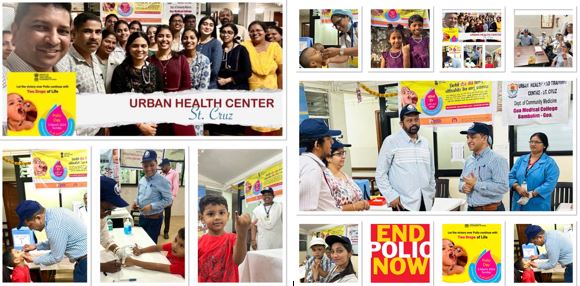An interview with Dr Amit Dias
March 3 is observed as Intensified Pulse Polio Day. On this occasion we spoke to Dr Amit Dias and asked him where we stand in our fight against polio. He said, “We are very close to eradicating the disease from the world, but we have to be extra cautious to ensure that we stay Polio Free.” Read this informative interview….
Goan Observer: Let’s start by trying to understand what is polio?
Dr Amit Dias: Poliomyelitis, commonly known as polio, is a highly infectious viral disease caused by the polio virus. It primarily affects children under the age of five and can lead to paralysis or even death in severe cases. The paralysis in polio is typically referred to as acute flaccid paralysis which helps us distinguish it from the other forms of paralysis in patients.
Q: Besides paralysis, what are the clinical manifestations of polio?
A: The clinical manifestations of polio vary from mild flu-like symptoms to more severe forms of paralysis. These can include fever, fatigue, headache, vomiting, stiffness in the neck and in some cases, paralysis of the limbs or respiratory muscles.
Q: What are the milestones in India with regard to the eradication of polio?
A: In the 1970s, India reported around two lakh cases of polio annually. We have come a long way since then with the last case being reported in Howrah in January 2014. India achieved a major milestone in polio eradication by being declared polio-free in 2014 by the World Health Organization. This was the result of concerted efforts by the government, healthcare workers and international organizations in implementing immunization campaigns, surveillance, and community engagement.

Q: Can you tell us why we still observe the National Intensified Pulse Polio Day in 2024? Why do we need the Pulse Polio program given that India has eradicated polio?
A: National Intensified Pulse Polio Day is observed to intensify efforts in eradicating polio by conducting a nationwide vaccination campaign. While India has been certified as polio-free, the threat of importation of polio virus from neighboring countries still exists. The Pulse Polio program ensures that every child receives multiple doses of the polio vaccine to build and maintain immunity, preventing any resurgence of the disease. If the virus enters our unvaccinated population, we will be back to square one. This will be a major blow to or war against polio.
Q: What is the status of polio in the world as of today?
A: As of March 2024 polio remains endemic in a few countries, primarily in parts of Africa, Afghanistan and Pakistan. However, global efforts continue to intensify vaccination campaigns and surveillance to eradicate the disease completely. As I mentioned earlier, we have eradicated it in India since 2014, but the virus can easily enter from our neighboring countries where the virus still exists.
Q: What vaccines do we have to fight polio?
A: The primary vaccines used to fight polio are the oral polio vaccine (OPV) and the inactivated polio vaccine (IPV). The OPV is the vaccine that is given during the pulse polio campaign. Both vaccines are highly effective in preventing poliovirus infection and transmission. IPV has been introduced in the National Immunization Program.
Q: What were the strategies that led to the eradication of polio?
A: The strategies that led to the eradication of polio included routine immunization, supplementary immunization campaigns, surveillance in detecting cases and rapid response to outbreaks. Additionally, community engagement and mobilization are crucial in reaching every child with the vaccine.
Q: Do we need to give the child vaccines in the routine immunization program as well?
A: Yes, absolutely. Routine immunization is essential in maintaining high levels of immunity against polio and other vaccine-preventable diseases. Vaccines administered through routine immunization programs ensure that children are protected from an early age. Through the pulse polio program we provide additional doses.

Q: Who is supposed to take the vaccine on the pulse polio day?
A: During the pulse polio round, all children of 0-5 years, irrespective of their previous vaccination status, are supposed to receive the polio vaccine. This ensures that every child is adequately protected against polio virus infection. Do inform the doctor in case your child is sick so that they can examine and take a call if the child should be given the vaccine.
Q: What is the significance of the eradication of polio?
A: The eradication of polio holds immense significance as it demonstrates the power of global collaboration and collective action in combating infectious diseases. We have managed to eradicate smallpox and if we intensify our efforts, we will be able to eradicate polio as well. It not only saves millions of children from lifelong paralysis but also paves the way for the eradication of other diseases through vaccination and public health interventions.
I take this opportunity to thank all the health care workers — doctors, nurses, ANMs, anganwadi workers who have put in their efforts, expertise and even risked their lives in the war against polio. Their unwavering commitment to the cause has brought us closer to a world free from this debilitating disease.
They have faced the daunting challenges, and tirelessly navigated through difficult terrains to reach every child in need of the two drops of life. Let’s continue to work together towards a polio-free world

